
Related
Guests
- Andrea VillagránGuatemalan congressmember with the political party Movimiento Semilla.
- Lucía IxchiuK’iche Indigenous leader who was forced into exile by the government of Guatemala’s right-wing former President Alejandro Giammattei.
- Frank La RueGuatemalan human rights activist, lawyer and a member of the election observation team.
Bernardo Arévalo was sworn in as president of Guatemala Monday after conservative leaders attempted for months to disqualify Arévalo’s landslide victory in August’s runoff presidential election by claiming election fraud and persecuting his progressive Semilla party up until the final hours before his inauguration. Arévalo is the son of the country’s first democratically elected president, who implemented a series of revolutionary reforms from 1945 to 1951 before a CIA-backed coup ousted his successor and ushered in decades of authoritarian rule. Many supporters see Arévalo’s presidency as a new spring for Guatemala. We discuss the battle to defend his election, the pro-democracy protests in the country and what Guatemala can expect from his leadership with three guests: Andrea Villagrán, Guatemalan congressmember with Movimiento Semilla; Lucía Ixchíu, exiled K’iche Indigenous leader; and Frank La Rue, Guatemalan human rights activist, lawyer and a member of the election observation team.
Transcript
AMY GOODMAN: We begin today’s show in Guatemala, where many say hope is blooming again after the long-delayed inauguration of the new president, Bernardo Arévalo. He was sworn in alongside Vice President Karin Herrera a few minutes past midnight Guatemala time on Monday. But that was not the time he was supposed to be sworn in. Opposition lawmakers delayed the ceremony by more than nine hours as a last-minute attempt by Guatemala’s corrupt elite to block his transition to power.
The move sparked more protest, with thousands of people pouring into Guatemala City from every corner of the country Sunday to witness this historic moment. Indigenous leaders held ceremonies and rallies, while Guatemala City’s Constitutional Plaza and Historic Center were filled with people celebrating. Arévalo spoke Monday after he was finally sworn in.
PRESIDENT BERNARDO ARÉVALO: [translated] What might appear to be simply the outcome of a political process and formal changes in institutions is in reality the starting point for a transformation that has begun in each and every one of us. In this shared horizon, we are united to weave the story of a country that we all aspire to see flourish and prosper. … We cannot become accustomed to the daily pain or look away from the mirror to avoid recognizing our painful realities. We cannot limit ourselves to dreaming of the future or clinging to the past. We must take responsibility for the present in the present. Guatemala presents us with tremendous challenges that we cannot ignore.
AMY GOODMAN: Following his inauguration, Arévalo tweeted, “Guatemala is moving forward.” In his first remarks as president, he thanked Guatemala’s youth, as well as Indigenous communities, who have led protests outside the Guatemalan Attorney General’s Office.
Arévalo’s victory shocked Guatemala’s right-wing political and business elite, which has controlled much of Guatemala for decades. Since his victory in August, the Guatemalan attorney general, Consuelo Porras, unleashed a campaign to prevent him from taking office, also targeting other Semilla party members — ”semilla” means “seed” — with unfounded accusations of fraud and other claims.
Bernardo Arévalo is the son of the former President Juan José Arévalo, Guatemala’s first democratically elected leader, who pushed for revolutionary policies when he was in office from 1945 to 1951. Three years later, in 1954, the CIA backed a coup, putting an end to democracy in Guatemala. Supporters see Bernardo Arévalo’s presidency as a new spring for Guatemala.
For more, we’re joined by three guests. We begin in Guatemala City, where we’re joined by Andrea Villagrán, Guatemalan congressmember with the political party Movimiento Semilla, the Seed Movement.
Welcome to Democracy Now! and congratulations, Congressmember. It was a nail-biter right to the end on Sunday. I watched hour after hour. I think Arévalo tweeted, “Hold on, everyone. It really is going to happen.” It took almost nine hours. For us, it was after 1:00 in the morning, Monday morning. Explain the significance of his victory, of all of your victories, as the attorney general has gone after all of you for so long.
ANDREA VILLAGRÁN: Hi. Good morning. Thank you very much for the invitation.
And here in Guatemala, we are living now moments of hope and a lot of joy, knowing that finally we have a president that represents us and that is fighting corruption and represents a change of what we have seen in the last decades. It’s a change in regime from a corrupt system, from an authoritarian system, to a democratic one. People choose Semilla because people reject all the traditional practices of corruption. In the Arévalo administration, we will focus, provide to the people what we are expecting and what we are asking from a long time ago. We were going to fight against corruption and focus on rescue the democratic institutions. We will try to rescue the public services, as health and education, basic services that all Guatemalans need.
JUAN GONZÁLEZ: And, Congressmember, could you talk about the situation in the Congress with conservative lawmakers trying to stop the new president’s program? What do things look like in Congress in terms of Semilla’s ability to move legislation forward?
ANDREA VILLAGRÁN: Well, what happened in Congress is basically that there is a group of corrupt congressmembers who still want to maintain their privileges and, basically, impunity and corruption. They are trying — they even tried everything on the 14th of January to delay the Congress session by making a lot of illegal actions to avoid the transition of power. But we won in Congress. We are 160. And from 160, 92 members of Congress defend democracy. And we were able to make the transition of power by midnight on the 14th. So, I think it was — a session in Congress was really hard and really intense. But at the end, the people won. The willing of our people, who choose Bernardo Arévalo and Karin Herrera, won. Democracy won. So we were able to make the transition of power by midnight of the 14th of January.
JUAN GONZÁLEZ: And could you tell us something about Semilla’s history, how it developed and came to this point?
ANDREA VILLAGRÁN: Yes, the Movimiento Semilla actually born in the protests of 2015, when we were in the middle of a lot of corruption cases that we were showing how the lawmakers’, how the politicians’ abuses were affecting all our lives in means of health crisis and a lot of the huge cost of living here. We saw there was a lot of migration because lack of opportunities, as well. So Movimiento Semilla start making as a political party with people that wanted to make a change. After two electoral processes — the previous electoral process, we were seven in Congress. Now we are 23 members in Congress.
And since June 25, when was the first round, and Bernardo Arévalo was elected going into the second round, and then on the 20th August was already — Bernardo Arévalo won the electoral process. We have been under attack more than six months, I will say, since June. We have received a lot of attacks trying to block him from taking the office. We are being defended by people. We have everything against us. We have the justice system against us, the Congress against us. The former president at that time, Alejandro Giammattei, was also attacking us. And we were — who defend us, basically, was people, who went to the streets to make protest, just exclaiming and defending their vote, their willing in the polls. There was a lot of Indigenous leaders who defend Movimiento Semilla, not because we were a political party that maybe represent their interests or their ideology; it was more because they defend democracy.
And what all these attacks in the last five months that we have received, what they have done is make a huge unity of people — the youth, the Indigenous leaders, all sectors, private sectors, I will say, as well — that want a new chapter in Guatemala’s political life, to move forward for a democratic system. So people get united and defend democracy. And that’s why we were able to get to this point. And that’s how we were able to get transfer the power on January 14, because we have been under a lot of obstacles, but we have been able to move forward because we have the support of the people who choose us.
AMY GOODMAN: Andrea Villagrán, we want to thank you so much for being with us, Guatemalan congressmember and a member of the Seed Movement, Movimiento Semilla. We are now going to stay in Guatemala City with Frank La Rue, Guatemalan human rights activist and lawyer. And we’re joined by Lucía Ixchíu, who is an exiled K’iche Indigenous leader, speaking to us from Bilbao, Spain.
Lucía, we’d like to begin with you. Part of Arévalo’s victory, in part, it is due to the incredible mobilization of Indigenous Guatemalans. If you can talk about that mobilization? You were one of the student leaders in 2015 who helped lead to the Seed Movement — right? — to Semilla, and to what we’re witnessing today in Guatemala.
LUCÍA IXCHÍU: Hello, everyone.
Well, for me, seeing my Indigenous authorities, 48 cantons, or 48 cantones, it’s an honor. I never imagined the idea to see all our Indigenous authorities taking the Guatemala City and recover the power, because I think, for me, it’s not exactly to the party elections. It’s not exactly about what are happening in this moment in Guatemala. We are facing against colonialism, 531 years fighting against slavery, because Guatemala is one of the most poverty countries all around the world, and the reality and the conditions until today is slavery. So, the people are doing a free process. For me, it’s a very radical moment. I never imagined that. I never imagined the Indigenous people taking the Guatemala City, because, of course, we always do the demonstrations in our highlands. We always defend the motherland. We always defend the territory. We always fight. We have more than 550 years fighting against colony extractivism.
But right now we know that we have to change the reality, because Guatemala is a dictatorship from the extremely right 17 years ago. This is not new. We only have the possibility to vote for extremely right parties. So, right now that’s why the people want to change this reality. And for us, it’s inspiration. I feel honored to be part of the K’iche people, from the 48 cantones, the Totonicapán, who is one of the leaders who — the Guatemalan country have to be grateful for the Indigenous authorities from all around the country. Because of that action, because of that strike, that demonstration, we have a country right now, and we can recover any small part of the democracy right now.
JUAN GONZÁLEZ: And, Lucía, you are now in Spain. You received political asylum there after fleeing from Guatemala. Could you talk a little bit about your own experience and the threats and the problems that you and your sister survived when you were in Guatemala?
LUCÍA IXCHÍU: Well, we lived three attempts to murder in Guatemala. I have two open cases for criminalization for being an Indigenous woman leader in Guatemala to want to change the reality, and my sister, too. My sister lived an attempt, too. So, all the time in Guatemala, the situation for the Indigenous, journalists, activists, as us, increase. And in the dictatorship and in the pandemic of the COVID-19, it was really horrible for the human rights defenders and the land defenders in Guatemala. The murders increased. The situation, it was really awful.
And that’s the reason why we don’t have nothing. We don’t have conditions to be a [judicial] case. We don’t have conditions, because it’s a dictatorship. The Prosecutor’s Office in Guatemala is part of the dictatorship. Guatemala, I say all the time, is a [judicial] dictatorship right now. And one, for me, the most of the challenges of the Bernardo Arévalo’s government right now is to change the Consuelo Porras, a mayor of the prosecutor officer, because we know that she is responsible of the exile of a lot of Indigenous leaders, of a lot of [judicial] — of a lot of people who was part of the office of the prosecution, and a lot of judges, too. So they are responsible. Alejandro Giammattei, Jimmy Morales, who is the other president of the last government, are responsible. And right now we can see a possibility to return to the country, but we need conditions, you know, because right now we are not sure if we can return to our country.
AMY GOODMAN: I want to go to that issue with Frank La Rue, of the kind of conditions that are necessary, and if the struggle, this inauguration of a new president means the end of the fight against what are known as the ”pacto de corruptos,” the corrupt pact of the military and governing and corporate elite in Guatemala. Frank, you are a longtime activist, lawyer, have seen what happened and know the history of 1954, when the U.S. helped overthrow the Guatemalan president for United Fruit. The Dulles brothers — right? — John Foster Dulles, secretary of state at the time, had represented United Fruit. He was its corporate lawyer. But what that meant for the hundreds of thousands of Guatemalans who were murdered over the years, and how that played out right through to Sunday, hour after hour waiting for this inauguration, with the last-minute skirmishes led by the congressmembers and the — the conservative congressmembers and the attorney general? Do you feel that Bernardo Arévalo is safe as president?
FRANK LA RUE: Well, thank you for the invitation, Amy.
And the answer is yes. I think, as my two predecessors said, I think the transition is real. And I was very glad to see that you mentioned there’s two precedents to this. One historical precedent is that Arevalo’s father was part of what was considered the first spring, which was then toppled by the '54 coup. But it's also important to mention that during all these years we had dictatorships and military regimes, and we went through a period of genocide. So, there’s over 200,000 victims in Guatemala that lost their lives for the peace process. And today, 27 years later after the peace process, we’re beginning to see the change in Guatemala. And I think this time the change is real.
One of the issues to highlight — I mean, there’s two, I think. Bernardo Arévalo is absolutely trustworthy. Everyone voted for him, not necessarily knowing him personally, but trusted his honesty, and trusted Semilla, the party. I agree with Congresswoman Villagrán that it was the enthusiasm of breaking with the past of corruption. But I also think that the other element to highlight — and Lucía Ixchíu mentioned it very clearly — was this was the opportunity for the Indigenous leadership and the ancestral leadership, as I call, to bring out their strength, to show the world and the ruling elites in Guatemala that have dominated with force and abuse, that this is a time of change. Guatemala is a country with serious cases of exclusion and differences, economic differences. There’s a huge gap in life between Indigenous and non-Indigenous communities. And this is the time for change. And I think the change is irreversible.
I honestly believe that Bernardo Arévalo and Karin Herrera will be able to initiate the change. I think change will take a lot of work. They’re inheriting a house in shambles and a country in shambles, with huge social problems and inequalities, and a torn-down state that does not guarantee nor safety, nor health, nor education, nor all basic services. So the challenge is enormous. But I think they’re up to this challenge.
But very importantly, and probably the most important factor, is the level of consciousness of the people of Guatemala. And I think the people voted, the young people in the cities, but especially the mobilizations that Lucía was mentioning of the Indigenous peoples. This was a sign of strength. And I think, against this, those that have ruled the country in the past know that they cannot defeat them, that this is a time, as Indigenous people said, “We’re not struggling for one election. We’re not struggling for one victory. We’re struggling to save democracy and to have them respect our vote.”
Now, obviously, those that are against Bernardo and the transition to democracy went to the very last day, as we all know now, with that long session of nine hours in Congress, went to the very last day trying to stop the transition, but were not able to do it. So, I think this is a moment of real hope in Guatemala. But it’s a hope because of the transition. It’s a hope because for the first time we have an honest and good government. But it’s also a hope because the people mobilized. And this is a victory of the people of Guatemala, especially the Indigenous people.
JUAN GONZÁLEZ: And, Frank, we don’t have much time, but I just wanted to ask you in terms of what you would expect from the United States government. Previous U.S. governments have always backed the corrupt elite of Guatemala in maintaining power. What is your hope now with this new administration that you would expect from the Biden administration and from Washington?
FRANK LA RUE: Well, we would hope full support. As a matter of fact, the U.S. and the international community, the OAS included, which doesn’t necessarily have that good a record in the past, either, or the European Union, everyone supported a transition. I think it came to the point where everyone recognized that Guatemala was about to collapse, to implode, if it kept on going in that direction, and that the only way to rescue it was to rescue democracy. And I think everyone has put their support behind Bernardo Arévalo, Karin Herrera and the Semilla party in government. And I think this is important.
Now, I think the support has to continue. One of the things that Bernardo said in his speech is “We thank the international community, but please don’t forget us. Coming to power is only but the first step and, in reality,” he said, “a very initial step of what has to be a long process. Please continue with us for the long term.”
Now, obviously, we’re linked to the different policies. This administration in Washington has made the right statements, had taken the right position. But we do remember, with the past administration, with the Trump administration, that this was the moment when CICIG, a good experiment on justice, was attacked by the elites, and the Trump administration turned their face away and let it collapse. This is very tragic. So it’s very, very crucial to understand that policies from Washington have an indirect effect in how much the elite over there thinks they can get away with.
AMY GOODMAN: Finally, Lucía Ixchíu, in Spain, though you’d like to be in Guatemala, though safe in Guatemala, we have less than a minute, but your final demands as this transition is made to the new Arévalo administration?
LUCÍA IXCHÍU: Well, right now we are organized as migrant and exiled people in Europe, and we are in contact with Network for Migrants in U.S., too. So, we have our own demands. We exist, and we are vital for the country, even if the country, even if the state forced to leave the country because of a lot of reasons. We have our demands, and we want to speak to the government of Bernardo, and we want to — and Karin, and we want to be here. We want to spoke, and we want to let them know what we want. And we want rights, and we want to recognize us as persons, even as migrant communities and exiled people outside the country, because we are vital. We create on a big intensity, activity and campaign for advocacy international in Europe and in U.S., and our work was vital for the democracy now in the country, too.
AMY GOODMAN: I want to thank you both for being with us. Lucía Ixchíu is exiled K’iche Indigenous leader, now in Bilbao, Spain, and Frank La Rue, Guatemalan human rights activist and lawyer, speaking to us from Guatemala City. We’d like to ask both of you to stay after the show so we can conduct our interview in Spanish and put it online at Democracy Now! en Español.
Next up, we get an update on the humanitarian crisis in Gaza as the U.N. secretary-general and rallies worldwide demand a ceasefire. Back in 20 seconds.

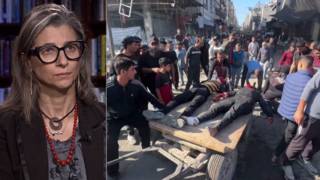
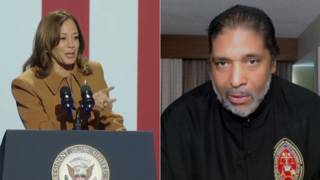

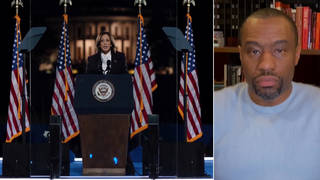



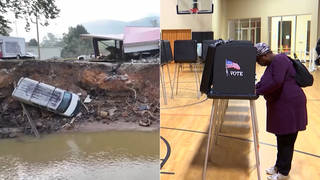

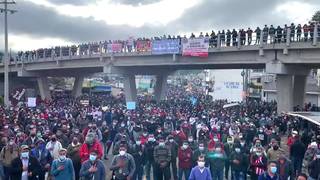


Media Options